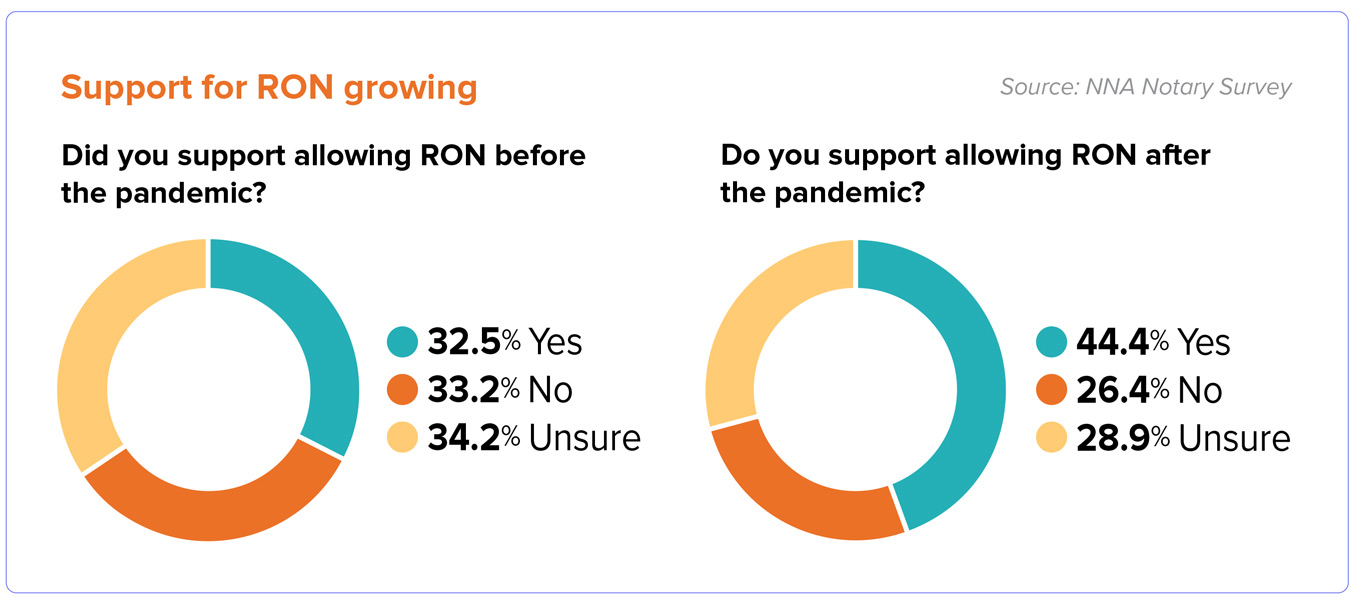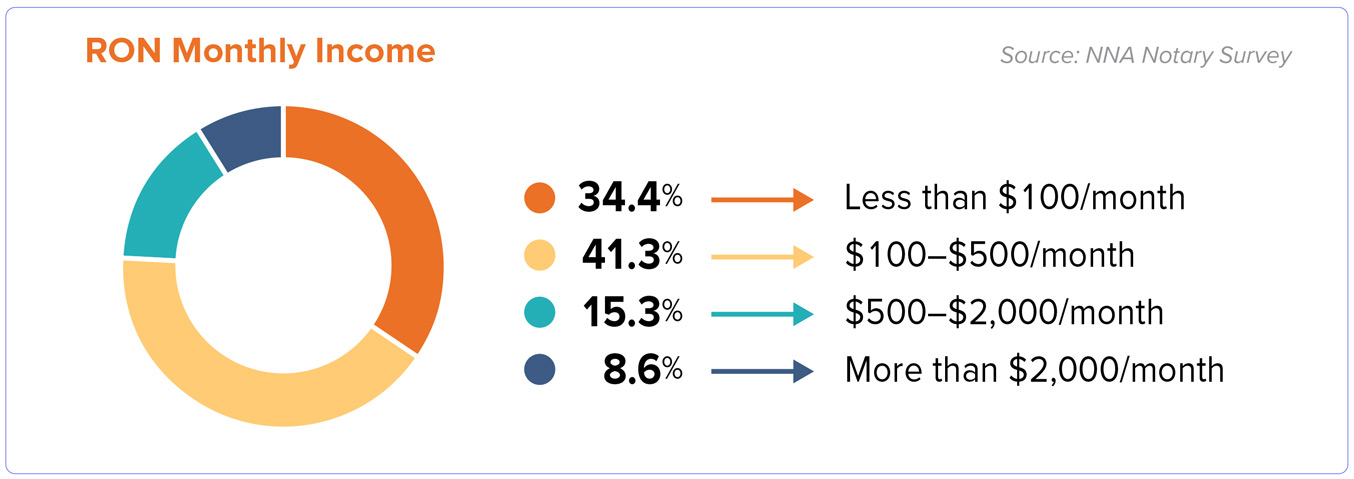Remote online notarization has been around for a decade. After a slow start, the idea of using audio-visual technology instead of in-person meetings with signers began to pick up steam. In practical terms, however, RON was still in its infancy. And then came the pandemic.
Part 2 of 3. As federal, state and local health agencies issued warnings against the dangers of face-to-face contact, state officials realized that RON and other forms of remote notarization could protect Notaries and signers from possible COVID exposure. Within months, every state but California and South Carolina had enacted permanent or temporary measures permitting remote notarization.
About the Special Report:
In the past year, Notaries as an industry faced — and overcame — remarkable challenges to emerge and thrive in the face of the COVID-19 pandemic and a struggling economy. The National Notary surveyed nearly 3,000 Notaries about their business, health and safety experiences over the past several months, and conducted in-depth interviews with Notaries from a wide variety of different backgrounds. In this 3-part series, we share what we learned about how Notaries managed to succeed in the face of unprecedented changes — and where Notaries are headed in the years to come.
Part 1: Notaries rising to the challenges of COVID-19
Part 3: How Notaries turned a national shutdown into business success
While the pandemic clearly helped drive the widespread acceptance of the idea of remote notarizations among lawmakers, it’s overall impact has been limited. Interviews with numerous remote Notaries and a recent, online survey of about 3,000 Notaries conducted by The National Notary indicate that the number of remote notarizations performed in the past year remained relatively small. This suggests that RON is not likely to displace traditional pen-and-paper notarizations anytime soon.
However, the opportunities it created abound, and the potential for Notaries in all walks of life is considerable.
Acceptance of remote notarization
2020 started with 22 states having permanent remote online notarization (RON) laws in various states of implementation. No other Notary policy issue in the history of Notary legislation in the U.S. has produced such sweeping results. Even with this explosive growth, opinions on RON within the Notary community were divided.
Prior to the pandemic, opinions about remote notarization were almost equally divided between supporters, non-supporters, and those who weren’t sure about RON, according to the survey. After the pandemic started, however, the numbers clearly changed. Support for RON increased significantly while opposition declined.

And nearly half of survey respondents said they feel remote notarization is safer than traditional in-person notarization during COVID-19.
“I am finding remote notarization to be a safer way to continue to do what I love and provide services to people for some of the most important transactions of their lives.”
Marcus Stodghill, Virginia Notary
Virginia Notary Marcus Stodghill is squarely in this camp: “I am finding remote notarization to be a safer way to continue to do what I love and provide services to people for some of the most important transactions of their lives.”
With the growing acceptance of remote notarizations due to COVID-19, very few people now question whether remote notarization will last. 30 states now have permanent RON laws, and enactments by the remaining states are not a matter of “if” but “when.” In addition, more Notaries and the public have experience with RON, and they like what they see.
“During the pandemic, remote notarizations were performed to keep people safe, but when life returns to normal people will rediscover RON because it is convenient,” observed Nancy Pratt, Senior Business Strategy Manager with Black Knight, which recently purchased RON provider DocVerify.
RON challenges for Notaries and signers in 2020
Some Notaries believe that acceptance of RON is just a matter of signers getting used to the possibility.
“At the beginning I didn’t have many customers because they weren’t used to it as an option. But as I do more RONs, people see how easy they are, so they refer me to other people,” said Betty Krachey, a Notary from Tennessee. “I have done land plats for some surveyors and they love it so much. They will email me the plat and I put it on my iPad and everyone signs electronically with my iPen. There are usually five or six signatures on each plat, so it’s much cleaner looking than having wet-signed notarizations.”

But it hasn’t all been easy for RON Notaries. Complicated state rules mean most Notaries must sign up with an online service platform, each of which has different ways of doing things. Plus, it may take a while to get used to the technology.
“I have performed only one RON and have been asked to do three,” Linda Savage of Arizona, said. “My biggest challenge was technology. The borrower could not get their camera to work initially, and I found my laptop screen was way too small to see the driver’s license and passport numbers. “
Cedric Knott, Ph.D., president of Alpha Consultant Group in Detroit Michigan, said that about 15% of his business now consists of RONs, while Virginia-based Notary Takeda Hinton, owner of Believe In Me Notary Signing Agency, LLC, has only performed one RON since qualifying in September 2020.
Theirs is a study in contrasts. Knott has found high acceptance among the vendors, while vendors won’t list Hinton until she gets adequate experience, but she first has to get the experience to be listed.
Knott reports that he felt the training he received was quite adequate. “We trained both as a Notary agent and as a borrower,” he says. “A couple of times I was able to troubleshoot with the borrower when they were having trouble.” He credits this “walking in the other person’s shoes” approach to training as a factor in his success.
On the flipside, Hinton said that she felt her training was inadequate. “It wasn’t as smooth as I would have liked it to be,” she says of her first RON notarization.
Ginger Hall of Virginia agreed with Hinton that RON training can be challenging, especially “learning the software, which is different for each agency.”
A new business opportunity for Notaries?
With more states allowing remote notarizations, Notaries now may wonder if they should start offering to perform them. Before deciding, Notaries should consider several factors. The first is to size up demand for Notary services.
“I was among the first Notaries to be authorized to perform remote notarizations in Florida,” said Notary John Bayne of Daytona Beach. There was no demand for his services at first when the law took effect January 1, 2020. But when the pandemic hit, Bayne said he went from performing “zero RONs to being crazy busy.” Since then, he has performed over 1,000 remote online notarizations. They now comprise upwards to 99% of the notarizations he performs, and he has three Notaries on staff to share the load.
Notarize, one remote online notarization provider, reported growth of 263% in 2020 for their retail line of business (direct RON transactions between consumers and Notaries) and an astonishing 826% growth in its real estate business.
Nancy Pratt of Black Knight told the NNA they have seen a 374% year-over-year increase in RON transactions from 2019 to 2020, with the bulk of the increase beginning in March through the end of 2020. Even with a heavy spike in the early weeks of the pandemic, growth leveled into a sustainable steady increase that held throughout the year.
Another factor Notaries should consider is competition. It may be a good time to enter the market if few other Notaries are offering a service for which demand is moderate or high or haven’t been offering the service for long.

Consider the following: All but a handful of our survey respondents who were authorized to perform RONs in states with permanent laws said they have been performing RONs for 1 year or less. Because virtually all Notaries are new at RON, the timing may be ripe to get in on a growing opportunity.
Obviously, financial considerations must be weighed. Remote Notaries in states with permanent laws report a wide range of income from RONs, with most earning anywhere from $100 a month to $2,000 a month. Some Notaries earn more than that.

As with offering any new service, patience is key. Notary Signing Agents know the feeling of starting out, signing up with companies, and wondering when the business will start to flow. Perhaps it may make the most sense to supplement one’s income with RON as a part-time venture or as a complement to other notarization service offerings.
Remote Ink Signed Notarization
During the first weeks of the pandemic, more than 30 states authorized temporary emergency rules for a variation of RONs called remote ink signed notarizations (RIN). Instead of using a technology platform with electronic documents and signatures, a RIN begins with a person signing a paper document with a pen and faxing, emailing, or “snail-mailing” it to the Notary. A video-conferencing app such as FaceTime, Zoom, or GoToMeeting — the main technology used in RIN — is used to connect the signer and Notary. Once connected online, the notarization proceeds much like a paper notarization.
There is no doubt remote ink signed notarizations have met a real need during COVID-19. However, the National Notary Association believes remote ink signed notarization is a temporary accommodation that will be replaced by remote online notarization when the public health emergency ends. Readers who want to read a fuller discussion of the reasons why the NNA believes RIN will be temporary may consult the NNA’s position paper entitled “Remote Ink Signed Notarization: Temporary Accommodation or Permanent Solution?”
Remote or paper notarizations?
Remote notarization gained significant ground in 2020. It is clearly here to stay, but will it replace paper notarizations anytime soon?
According to our survey, most remote Notaries said that RONs account for one-quarter or less of their total Notary work. And despite its widespread adoption by state lawmakers, only a small portion of Notaries are authorized to perform RONs. This suggests that even with all the emphasis on keeping people socially distant during the pandemic, business prospects for traditional notarizations will remain strong as well in the foreseeable future.
Today, the legal framework has been put into place to support remote online notarizations. Notaries have demonstrated they are willing to enter the market to offer remote notarization as a service. The technology is mature. More lenders are using it and major players such as Black Knight and Stewart Title have recently acquired major RON platforms to leverage their remote notarization capabilities. But we have not yet reached the point where eNotarizations and remote notarizations have become the norm.
As for the NNA, our mission is notarization of all types, and we are committed to supporting Notaries who perform every type of notarization, whether they are paper, electronic, or remote notarizations.
Bill Anderson is Vice President of Government Affairs for the National Notary Association.